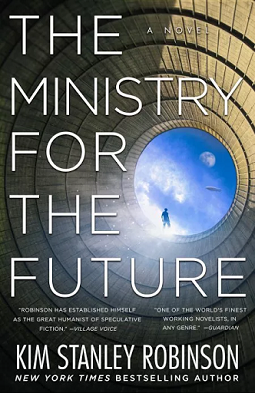The Ministry for the Future
Enjoying this book by Kim Stanley Robinson. It’s less a novel than New York 2140, or Aurora, the only other books of his that I’ve read.

A science fiction novel rooted in non-fiction
More like an amalgam of random various texts – some scientific, some philosophical, some journalistic, some anecdotal – with a bit of a storyline and a few characters to hold it together. But, in so far as presenting a possible future history of climate change, and climate action, in the mid-21st century, the formula works. And, more importantly, it fulfills the promise of serious speculative science fiction, of getting us to think about the future that we are making for ourselves, right now.
I thought about that today, when spending the afternoon with my grandchildren. I considered their own hopes and dreams, and how some of these might be stymied by the increasing devastation of the planet.
I just came back from flights overseas – flights that took me to Portugal via Belgium: looking at that absurd right-angle on the map makes me feel ridiculous. Like the times I reached Delhi via Moscow. I think in future, if I fly to Europe it will be to the city nearest to my intended destination – then overland, somehow. But, when I check the possibilities, the costs of such travel far exceeds that of plane tickets, unfortunately. In a better world, governments would be doing more to reduce the costs of overland public transport. There’s still no real way to get from Israel to Europe or the rest of Asia other than by flying. The ferries of yesteryear, that plied the routes between Palestine, Greece and Italy, are no more, and the uncertainties of travel in Iran, Afghanistan and Pakistan prevents passage through those countries to further east. The world is less open today, and travel is more dependent upon airplanes, than when I was young.
Links: Food
Gates-Funded ‘Green Revolution’ in Africa Has Failed, Critics Say
Critics say the Alliance for a Green Revolution in Africa, founded in 2006 with money from the Gates and Rockefeller foundations, has promoted an industrial model of agriculture that poisons soils with chemicals and encourages farmers to go into debt by buying expensive seeds, fertilizers and pesticides. As a result of that debt, some farmers have had to sell their land or household goods like stoves and TVs, said Celestine Otieno and Anne Maina, both active with organizations in Kenya advocating for ecologically friendly practices. “I think it’s the second phase of colonization,” Otieno said.
